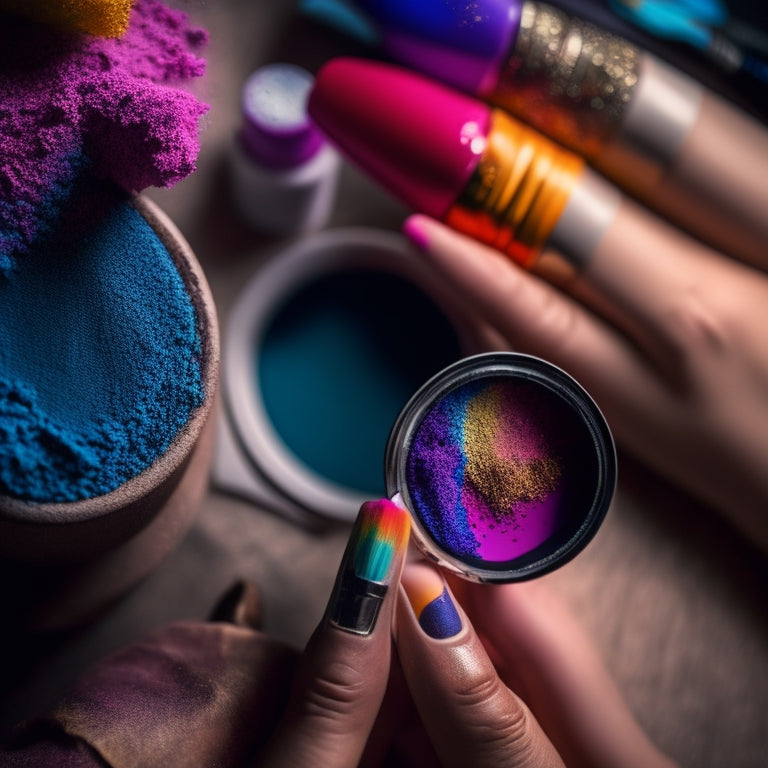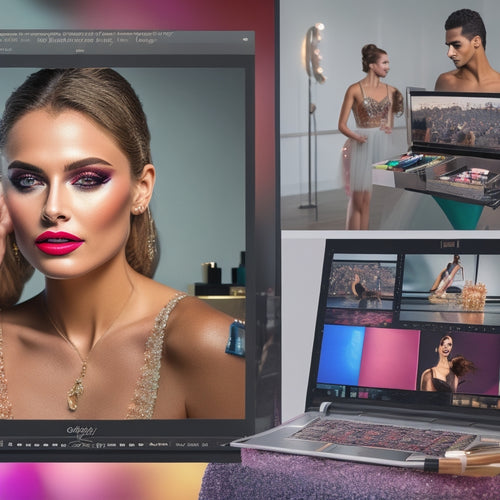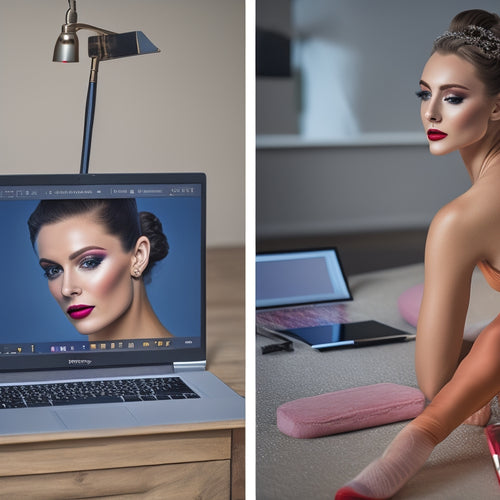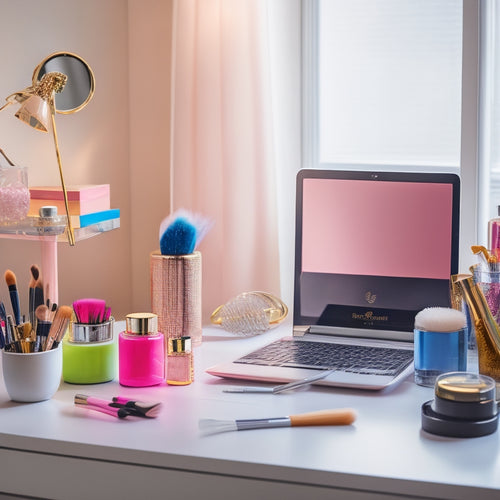
Master Special Effects Makeup With Online Courses
Share
You're ready to master special effects makeup and embark on a professional career. Start by selecting an online course that aligns with your learning style and goals. Look for courses with video demos, interactive exercises, and expert instructors. Transform your workspace into a creative sanctuary, dedicating a specific area for studies and organizing supplies within easy reach. With online courses, you'll learn airbrushing, silicone molding, and prosthetic design. You'll refine your skills, creating realistic skin tones, wounds, and characters. As you progress, you'll develop a portfolio, stay updated on industry trends, and make a successful shift into a special effects makeup career - and this is just the beginning of your creative journey.
Key Takeaways
• Immerse in online courses that align with your learning style and goals to master special effects makeup techniques.
• Set up a dedicated workspace with ergonomic furniture and organized supplies to practice and refine skills.
• Learn various special effects techniques, including airbrushing, silicone molding, and wound creation to bring characters to life.
• Develop a strong foundation in basic makeup skills, including priming, concealing, and highlighting to achieve a flawless finish.
• Build a professional portfolio showcasing diverse special effects creations to attract clients and employers in the industry.
Choosing the Right Online Course
Immerse yourself in the world of special effects makeup online courses, and you'll quickly realize that selecting the right one can make all the difference between mastering the art of transformation and getting lost in a sea of mediocre tutorials.
With so many options available, selecting a course that aligns with your learning style and goals is crucial.
Begin by reading course reviews from previous students to get a sense of the instructor's teaching style and the course's overall quality. Pay attention to the comments and ratings, as they'll give you an idea of what to expect.
Consider your own learning style, too - do you learn better through video demonstrations, step-by-step guides, or interactive exercises? Look for courses that cater to your preferences to make sure you stay engaged and motivated throughout the program.
Setting Up Your Learning Space
With a course chosen, transform your workspace into a creative sanctuary by dedicating a specific area to your special effects makeup online course. Here, you can focus on mastering the art of transformation without distractions.
This space should be tailored to your needs, ensuring you stay comfortable and focused during long study sessions. Invest in ergonomic furniture, such as a comfortable chair and a desk with good lighting, to prevent fatigue and eye strain.
Organize your supplies and materials within easy reach, keeping your workspace clutter-free and efficient. Establishing a routine is essential, so develop good study habits from the start.
Set aside dedicated time for learning, and stick to it. Create a schedule that works for you, allowing for regular breaks to recharge and refocus.
Mastering Basic Makeup Skills Online
As you immerse yourself in the world of special effects makeup, establishing a strong foundation in basic makeup skills is essential, and online courses offer a convenient and flexible way to master these essential techniques from the comfort of your dedicated learning space.
You'll learn the fundamentals of makeup application, including sanitation, brushwork, and color theory. Online courses provide access to expert instructors who'll guide you through video tutorials, step-by-step demonstrations, and interactive exercises.
You'll discover the importance of priming, concealing, and highlighting, and how to create a flawless base that's essential for special effects makeup. By mastering these Makeup Essentials, you'll build a solid foundation for more advanced techniques.
Through online courses, you'll have the flexibility to practice and refine your skills at your own pace, ensuring that your Skill Building is consistent and well-rounded. With each new technique you master, your confidence will grow, and you'll be well on your way to becoming a skilled special effects makeup artist.
Special Effects Techniques and Tools
Now that you've thoroughly explored the basics, you'll immerse yourself in the exciting world of special effects techniques and tools, where you'll learn to create realistic wounds, scars, and prosthetics that'll bring your characters to life. You'll uncover the art of airbrushing basics, mastering the subtle nuances of color and shading to create breathtakingly realistic skin tones and textures. You'll also venture into the domain of silicone molding, crafting intricate prosthetics that'll transform your actors into unrecognizable characters.
| Technique | Description |
|---|---|
| Airbrushing | Create realistic skin tones and textures with precise control over color and shading. |
| Silicone Molding | Craft intricate prosthetics that'll transform your actors into unrecognizable characters. |
| Wound Creation | Learn to create realistic wounds, scars, and abrasions that'll add depth to your characters' stories. |
With these techniques and tools at your disposal, you'll be able to bring your characters to life in ways you never thought possible. Whether you're creating a gruesome zombie apocalypse or a futuristic sci-fi epic, you'll have the skills to create breathtakingly realistic special effects that'll leave your audience in awe.
Understanding Prosthetics and Appliances
You'll explore the mesmerizing world of prosthetics and appliances, where you'll master the art of designing and applying custom-made pieces that seamlessly blend with your actors' skin, creating a transformative experience for your audience.
As you dive deeper, you'll discover the versatility of prosthetic materials, from silicone molding to foam latex, each with its unique characteristics and applications.
You'll learn the intricacies of appliance design, understanding how to create pieces that not only look realistic but also feel comfortable for the actor to wear. Fabrication techniques, such as casting processes, will become second nature to you, allowing you to craft intricate details that elevate your designs.
With a range of adhesive options at your disposal, you'll confidently attach your creations, ensuring a flawless finish. Sculpting methods will also become an essential skill, as you learn to shape and mold materials to achieve the desired look.
Creating Realistic Wounds and Injuries
With a skilled hand and an artistic eye, you'll craft realistic wounds and injuries that tell a story, evoking emotions and drawing your audience into the narrative.
To achieve this, you'll need to explore the intricacies of wound anatomy, studying the way skin tears, bruises, and scars. You'll learn to replicate the subtle nuances of injury, from the subtle discoloration of a bruise to the jagged edges of a laceration.
Injury storytelling is an art form in itself, requiring a deep understanding of the narrative behind the wound. What's the story behind the scar? Was it a brutal attack or a tragic accident?
Your makeup skills will transport the audience to a world of drama and suspense, making them engaged in the character's plight.
Working With Different Skin Tones
As you explore the world of special effects makeup, you'll quickly realize that working with different skin tones is an essential aspect of creating realistic characters.
You'll need to master the art of tone matching, ensuring that your makeup blends seamlessly with the actor's natural skin tone.
From selecting the perfect foundation shade to understanding how to adapt your techniques for various skin types, you'll learn the essential skills to bring your characters to life.
Tone Matching Essentials
Mastering tone matching is vital in special effects makeup. It requires creating an illusion that seamlessly blends with the actor's natural skin tone, which can range from porcelain doll-like complexions to rich, dark chocolate hues.
As you explore the world of tone matching, you'll discover that it's not just about matching the surface color of the skin, but also understanding the underlying skin undertones. Skin undertones can be warm, cool, or neutral, and this differentiation is essential in creating a believable illusion.
To excel in tone matching, you'll need to grasp the fundamentals of color theory, including the color wheel and how to mix colors to achieve the perfect match. Understanding how to analyze skin undertones and apply color theory principles will enable you to create special effects makeup that looks incredibly realistic.
With practice and patience, you'll develop the skills to create an illusion that's virtually indistinguishable from reality.
Foundation Shade Selection
Now that you've grasped the fundamentals of tone matching, it's time to put your skills to the test by selecting the perfect foundation shade for a diverse range of skin tones, from the fairest porcelain complexions to the richest, darkest hues.
When working with different skin tones, it's important to take into account skin undertones, which can greatly impact the final result. Understanding color theory is vital in finding the perfect match.
Here are some key considerations:
-
Warm undertones: Look for yellow or golden undertones in the skin, which can be complemented with warm-toned foundations.
-
Cool undertones: Identify pink or blue undertones, which are best paired with cool-toned foundations.
-
Neutral undertones: Balance warm and cool undertones with neutral foundations that won't lean too heavily in either direction.
- Deep, dark skin tones: Focus on rich, cool-toned foundations that won't ash or gray out the skin.
Building a Special Effects Portfolio
By showcasing your most impressive and diverse special effects makeup creations in a professional portfolio, you'll be able to demonstrate your skills to potential clients, employers, and collaborators. Your portfolio goals should be to showcase a wide range of techniques, from subtle character design to intricate prosthetics. This won't only highlight your technical skills but also your creativity and attention to detail.
In today's digital age, having an online presence is essential. Consider creating a website or social media profiles dedicated to your special effects makeup work. This will allow you to easily share your portfolio with a global audience and attract potential clients.
When building your online portfolio, make sure to include high-quality images, detailed descriptions of your process, and any relevant testimonials. By doing so, you'll be able to showcase your expertise and attract opportunities that will help you grow as a special effects makeup artist.
Staying Up-To-Date With Industry Trends
As you navigate the ever-evolving landscape of special effects makeup, it's essential that you stay attuned to the latest industry trends, techniques, and products to remain competitive. Staying up-to-date allows you to anticipate and adapt to changes in the industry, ensuring your skills remain in high demand.
To stay ahead of the curve, prioritize the following:
-
Industry Insights: Follow industry leaders, blogs, and social media to stay informed about the latest developments and breakthroughs in special effects makeup.
-
Trend Forecasting: Analyze current trends and predict future directions in the industry to stay one step ahead.
-
Product Knowledge: Familiarize yourself with new products, tools, and materials as they emerge, and understand their applications and limitations.
- Community Engagement: Participate in online forums, attend workshops, and connect with peers to share knowledge, learn from others, and stay inspired.
Turning Your Skills Into a Career
As you've honed your special effects makeup skills through online courses, it's time to turn your passion into a career.
You're now poised to take the next step by building a portfolio that showcases your expertise, developing a niche that sets you apart, and creating a brand that screams 'hired!'
Your career in special effects makeup awaits, and it's time to make it a reality.
Building a Portfolio
With a solid foundation in special effects makeup skills, you're now ready to showcase your talents to the world, and that starts with building a portfolio that screams 'Hire me!'
A strong portfolio is essential to landing jobs, attracting clients, and standing out in the competitive makeup industry. To get started, define your portfolio goals: what kind of work do you want to showcase, and what kind of clients do you want to attract?
Here are some tips to help you build a killer portfolio:
-
Develop an online presence: Create a professional website or social media profiles to showcase your work and make it easily accessible to potential clients.
-
Curate your best work: Select only your most impressive pieces that demonstrate your skills and versatility.
-
Showcase your process: Include behind-the-scenes content, like tutorials or time-lapses, to give clients an idea of your creative process.
- Keep it up-to-date: Regularly update your portfolio with fresh content to demonstrate your growth and versatility as an artist.
Developing a Niche
Now that you've mastered the art of showcasing your special effects makeup skills, it's time to turn your passion into a lucrative career by identifying a niche that sets you apart from the competition and attracts high-paying clients.
Developing a niche is vital in market segmentation, allowing you to focus on a specific area of special effects makeup and establishing yourself as an expert. This targeted approach enables you to stand out in a crowded industry and attract clients seeking specialized services.
To identify your niche, reflect on your strengths, interests, and the type of projects that excite you. Are you fascinated by creature design, or do you excel in creating realistic wounds? Perhaps you have a talent for transforming actors into characters from sci-fi or fantasy worlds.
Creating a Brand
Your special effects makeup skills are the raw materials, and it's time to forge them into a brand that opens doors to lucrative opportunities, attracts high-profile clients, and turns your passion into a sustainable career.
As you build your brand, remember that it's not just about showcasing your skills, but also about creating a unique identity that sets you apart from the competition. Your brand identity should reflect your values, style, and personality, making it relatable and memorable to your target audience.
Here are some essential steps to help you create a strong brand:
-
Define your niche: Identify your specialty within special effects makeup, whether it's horror, fantasy, or beauty.
-
Develop a unique visual brand: Create a consistent visual aesthetic across your website, social media, and marketing materials.
-
Craft a compelling story: Share your journey, inspirations, and values to connect with your audience on a deeper level.
- Leverage social media: Showcase your work, engage with your audience, and collaborate with other artists to increase your online presence.
Frequently Asked Questions
Can I Learn Special Effects Makeup Without Prior Makeup Experience?
Imagine being a blank canvas, ready for art. You can start from scratch, just like a painter learning to hold a brush. Without prior makeup experience, you can still learn special effects makeup, building basic skills from a fresh start.
How Long Does It Take to Master Special Effects Makeup Skills?
You'll reach a skill plateau if you don't consistently practice special effects makeup; it'll take you around 1-3 years to master the basics, but with dedication, you'll refine your skills, and that's when the real magic happens, sweetheart!
Are Online Courses Recognized by the Film and Television Industry?
You'll be relieved to know that online courses can lead to industry recognition, as long as they're accredited and offer professional certification, meeting industry standards, which most employers respect and recognize.
Can I Use Online Courses to Learn Special Effects Makeup for Personal Use?
You can tap into your creativity and learn special effects makeup for personal projects, finding endless makeup inspiration online, and crafting unique looks that reflect your personality, all from the comfort of your own space.
Are Online Courses Suitable for Those With Limited Artistic Talent?
You don't need a natural aptitude for art to excel in special effects makeup; online courses will guide you through techniques, giving you creative freedom to experiment and find your own unique style, regardless of your artistic background.
Related Posts
-

Learn Dance Makeup Artistry Online: A Step-by-Step Guide
You're about to begin an exciting journey to master the art of dance makeup online! First, you'll need to select the ...
-

10 Online Makeup Tutorials for Ballet Dancers
You're about to discover a range of makeup techniques specifically designed to enhance your ballet performances, from...
-

3 Best Online Tools for Organized Dance Makeup Artists
You need online tools to streamline your workflow and deliver exceptional service to your dance clients. For seamless...


